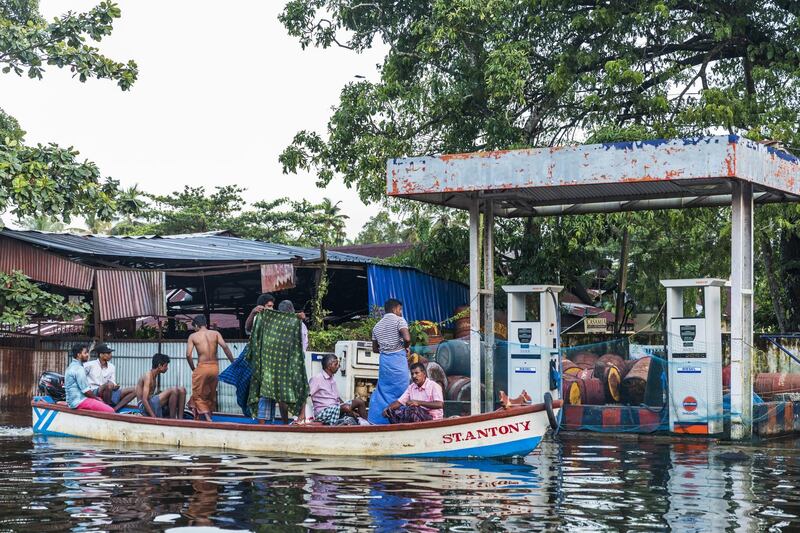Even as its floodwaters recede, the Indian state of Kerala faces a multibillion-rupee challenge of rehabilitating people and rebuilding homes and infrastructure, an unprecedented task for a state with almost one million people in emergency camps.
One hundred thousand homes, 10,000 kilometres of roads, at least 200 billion rupees (Dh10.5bn) worth of damage – the list goes on.
The logistics alone will take billions in investment from the world’s second most populous country, a bill that Delhi insists on financing itself.
The Ministry of External Affairs said India “deeply appreciates” offers of assistance of several countries but rejected any offer of a government-to-government transfer of funds.
“In line with the existing policy, the government is committed to meeting the requirements for relief and rehabilitation through domestic efforts,” a spokesperson said on Wednesday night.
India’s policy of refusing foreign financial help for domestic disasters dates back to the 2004 tsunami, which inflicted heavy damage on the country’s south-eastern coast. India’s prime minister at the time, Manmohan Singh, said: “We feel that we can cope with the situation on our own and we will take [other countries’] help if needed.”
The refusal to accept other foreign assistance is not thought to extend to help with extensive redevelopment work in Kerala, particularly from charitable foundations and philanthropists who are already raising millions.
The focus has already turned to rebuilding, and the state will need new schools and hospitals.
Millions of dirhams were raised in the UAE in just 48 hours, including about Dh40 million between four Indian businessmen: Yusuff Ali M A, founder of Lulu supermarkets, B R Shetty, founder of NMC Healthcare, Sunny Varkey, the founder of school operator Gems Education, and Dr Shamsheer Vayalil, founder and managing director of UAE-based VPS Healthcare.
Individual donations thought to total millions have also been made. Roughly three million Indians live in the UAE, and nearly 80 per cent of them are from Kerala.
_______________
[ UAE 'stands with Indian people' after Kerala floods, says Sheikh Mohammed ]
WATCH: Emirates flies aid to flood-hit Kerala
_______________
Kerala’s politicians have lashed out the central government's stance against accepting help from foreign governments, given the scale of the flood damage and the relatively meagre amount of financial help it has promised the state so far.
Thomas Isaac, the state finance minister, complained about this on Wednesday.
Kerala has asked the federal government for 22bn rupees in financial support, Mr Isaac said on Twitter, but it has been promised only 6bn from New Delhi.
Last year, when floods hit the state of Bihar, Mr Modi’s administration had sanctioned roughly 17bn rupees in monetary aid.
On the ground in Kerala, search and rescue operations have ended, but nearly a million people remain in emergency camps. Even to return to their villages and towns will prove difficult, said Ray Kancharla, humanitarian manager for Save the Children in India.
“In many villages, the water has not fully gone,” Mr Kancharla said. “Houses have been washed away, bridges have collapsed, and roads are inaccessible. We went into some areas, and getting around is still difficult.”
Even if people are able to go back home, they will face immediate challenges of procuring clean water and adequate sanitation. Their livelihoods will need to be rebuilt. “There’s been huge losses in agriculture, and we must remember that many people haven’t worked over the last few weeks, so they probably won’t have any cash at hand,” Mr Kancharla said.
Transport links are still uncertain. The state's main airport at Kochi, which one city resident described to The National as resembling "an island in the middle of a river" during the floods, is scheduled to reopen only on August 29.
Kerala is seeking the federal government’s permission to raise its ability to borrow from the capital markets to finance the rebuilding of the state. States are allowed to borrow up to 3 per cent of their gross domestic product, but Kerala is requesting a limit of 4.5 per cent. The extra 1.5 per cent will translate into an additional 105bn rupees.
“A new Kerala has to be built,” said Pinarayi Vijayan, Kerala’s chief minister.
_______________
Read more:
'When there's disaster, people unite': UAE's rich and poor unite to help Kerala flood victims
'Everything is lost': Indian expatriates in UAE speak of Kerala flood devastation
_______________
Mr Vijayan and other ministers in his cabinet have already donated their salaries to the state’s relief fund. Other state governments have also pledged monetary assistance, as have various companies, non-profits, and civil society fundraisers.
In perhaps the most touching of these gestures, inmates in Kerala’s prisons donated several tonnes of food, clothes and medicines, as well as 1.2 million rupees from their wages, towards the relief effort.
Still, the process of returning the state to normality will be a long and arduous one. Reconstructing Kerala will take anything up to nine months, perhaps even more, Mr Kancharla said. “This isn’t a 100-metre race, it’s a marathon.”





